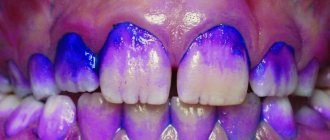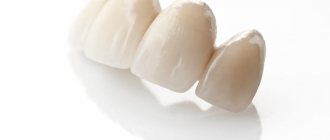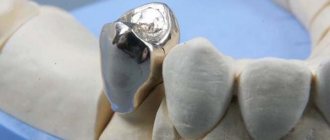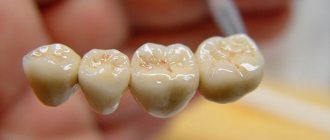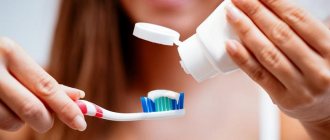Today, metal-ceramics is considered one of the most popular materials for prosthetics in dentistry. Its main advantages are high strength and durability, decent aesthetics and affordable cost. However, in order for prosthetics to be truly durable and reliable, the patient should know how to properly care for metal-ceramic teeth and carry out such care regularly.
Rules for caring for metal-ceramic teeth
Despite the fact that caring for metal-ceramic teeth is quite simple and does not require any special effort, it should be done daily, regularly and carefully - only in this case the patient can be sure that the structures will last a long time and will not cause problems. The basic rules of care are:
- You should brush your teeth at least twice a day, using vertical sweeping movements in the direction from the gums to the cutting edge of the teeth.
- It is better to use a brush with soft bristles that will not injure your gums. You can use the most ordinary toothpaste, but in cases where most of the dentition in the mouth is replaced by dentures, it is better to choose toothpastes that care for the gums (containing herbal extracts or propolis).
- You can’t limit yourself to just cleaning, since you need to care for metal-ceramic crowns just as carefully as you take care of your “natural” teeth, so after each cleaning, the interdental spaces are cleaned with dental floss.
- After cleaning, you should rinse your mouth thoroughly - first with water, and then with an antiseptic solution, which the dentist will recommend.
- If a person smokes, often drinks coffee or other staining and plaque-creating drinks and products, it is necessary to regularly carry out hygienic cleaning at the dentist, since caring for metal ceramics only at home will clearly not be enough. Whitening pastes do not affect artificial teeth and therefore will not give any effect.
Dentists recommend that patients who have metal-ceramic bridge structures installed do not forget to thoroughly clean the rinsing channel located between the crown and the gum during hygiene procedures - if this is not done, food debris will accumulate and gradually decompose in the channel, and bad breath will appear .
Hygiene products for cleaning implants, crowns, dental bridges
To clean fixed dentures you will need the following hygiene products:
. The cleaning brush should have an appropriate degree of bristles so as not to scratch the denture or wear it off. In addition to the main one, you will need a special mono-beam, narrow and thin - for cleaning interdental spaces and difficult places that are inaccessible to a regular brush. It is used after basic brushing; toothpaste is not required for such a cheek.
Toothbrush- Toothpaste . Dentists do not have any special requirements for the paste; you can use a regular one that is suitable for your situation. It is worth noting that whitening pastes or enamel strengthening pastes will not be as effective if you have a lot of fillings, crowns or implants in your mouth. When choosing, dentists recommend giving preference to pastes that have an effect not on the teeth, but on the gums. If you have gum disease or increased plaque formation, you can use pastes with antiseptic properties or herbal extracts.
- Floss . Cleaning the dentures in the area adjacent to the gums is an extremely important step in cleaning. Dental floss will help cope with plaque; for this, there are two types of floss - flat for narrow spaces between teeth, round for wider areas. It is advisable to floss after every meal to remove food particles that get stuck while eating.
- Irrigators and rinses . The irrigator effectively removes bacteria not only from teeth and gums, but also from the tongue. The irrigator can be refilled with both plain water and rinse aid, but it cannot be used during exacerbation of chronic oral diseases. Rinses are prescribed by the dentist if necessary. Consult your doctor before use, especially if you decide to purchase a product with antiseptic or antibacterial properties. Rinsers and irrigators cannot replace full hygiene with a brush and dental floss, so use them after basic procedures.
Caring for fixed dentures is important throughout their lifespan. Careful care of implants and crowns extends their service life, in some cases up to several decades. It is important to remember that in addition to home care, it is necessary to undergo regular preventive examinations, have professional cleaning, and protect dentures from chips, cracks and scratches. At the “Royal Smile” dentistry, after installing implants, crowns or dental bridges, you will receive all the recommendations for caring for them, as well as choosing a brush, paste and additional hygiene products.
How to care for metal-ceramic crowns besides cleaning?
The main misconception of patients who do not know exactly how to properly care for metal-ceramic teeth is that they consider artificial teeth to be stronger than natural ones. As a result, a person may try to chew nuts or eat food that is too cold or too hot. In fact, this cannot be done, since the ceramic coating of a prosthetic structure can be damaged in the same way as natural enamel - chips and scratches form on it from hard food, and cracks from contrasting temperatures.
In addition, many people believe that plaque cannot form on metal-ceramic crowns in principle and therefore it is not necessary to clean them too thoroughly. This is not true - when consuming certain foods and drinks, as well as smoking, plaque still forms, and it is better to remove it in the dentist's office during regular hygiene measures (about once every six months to a year).
Care
Caring for metal-ceramic crowns is easy. They are easy to clean and do not require the use of special devices.
What to do if a tooth has rotted under the crown
Tooth decay under the crown is a complication caused by prolonged use of the prosthesis or its improper hygienic care.
When carrying out hygienic procedures for caring for structures, it is recommended to follow a number of certain rules:
- Clean your teeth in the morning and evening, as well as after each meal.
- If possible, exclude strong coffee and tea from your diet, and stop smoking, as this can cause plaque to appear on the surface of your teeth, which will be difficult to remove in the future.
- Regularly visit the dental office for professional cleaning, removal of plaque from the surface of products, and removal of tartar.
- When wearing removable structures, remove them at night and clean them well. After this, the product must be dried and placed in a special container with a storage solution.
- Do not eat too cold or hot foods, and also avoid sudden temperature changes. For example, it is strictly forbidden to drink hot tea immediately after ice cream. Such a negative impact can lead to cracks in the product.
- Avoid too hard foods, do not open bottles with your teeth and do not chew nuts. Despite the fact that artificial teeth are durable, after such manipulations the risk of damage to the coating of the structure increases.
- Limit the presence of sugar, chocolate products and honey in your diet. Such products can damage not only metal-ceramic products, but also natural dental units.
In addition, even when wearing a metal-ceramic product, it is necessary to undergo a preventive examination by a specialist at least twice a year.
Cleaning
In addition to following all of the above recommendations, you need to be able to clean cermet teeth properly. For this procedure, only a soft toothbrush is used. All movements are carried out strictly in a vertical direction from the gum tissue to the edge of the crown.
Metal-ceramic structures do not require special care.
They are durable, so brushes of any hardness are suitable. And when choosing a paste, they prefer products to strengthen the gums. The only limitation is to avoid excessively hard food, as this can cause the ceramic to chip and expose the dark iron frame.
Dentist
Novikova Olga Alexandrovna
8 years of experience
No less important attention should be paid to the space between the teeth. It is better to use a paste that contains propolis or herbal preparations. It is necessary to clean the dental surface not only after waking up and before going to bed at night, but also after each meal.
To clean the interdental space as best as possible, dentists recommend not to ignore the use of dental floss, or floss. Upon completion of the procedure, the oral cavity must be rinsed with special solutions (rinses).
If metal-ceramic bridges have been installed, then the flushing channels located between the gums and artificial crowns must be cleaned with special care. If you do not pay due attention to this, then food debris begins to accumulate in the cavity, which subsequently leads to rotting and the appearance of an unpleasant odor.
To clean such spaces, special small brushes (tooth brushes) are used. When plaque forms on the surface, special products are used that the dentist may recommend.
How to properly clean metal-ceramic dental crowns
The popularity of metal-ceramic crowns is deserved.
They are durable, reliable and comfortable to use. The smooth surface of the products copes well with plaque. A beautiful snow-white smile that does not lose its tonal freshness over time is a huge plus. But everything needs care, even such durable technological designs. To the delight of metal-ceramic wearers, cleaning dental crowns of this type does not cause difficulties. It differs from caring for real teeth and also requires regularity. However, there are no difficulties, and no specific manipulations are required.
Cleaning cermets
Metal-ceramic crowns should be cleaned using the following recommendations:
- cleaning is performed with a regular toothbrush from the gums to the edges with vertical movements, trying to treat the space between the teeth as thoroughly as possible; It is recommended to choose a paste taking into account the needs of the gums rather than the teeth, since dental chemistry does not have a noticeable effect on metal-ceramics; It is best to use a herbal paste;
- the use of paste is complemented by cleaning the teeth with floss - it is necessary to make movements in all possible directions;
- After cleaning the dental crowns, rinse your mouth with water and a special product recommended by a specialist.
If you have a bridge, you need to very carefully wash the rinsing channel - the space between the gum and the artificial tooth. Food gets under a metal-ceramic crown only in the event of poor-quality work by the dentist. And it can easily get into the gap between the gum and tooth.
As a result of gum pliability and the penetration of pieces of food under it, the tissue becomes inflamed. It will no longer be possible to remove the foreign fragment without the intervention of a doctor. Symptoms will include discomfort and even pain, plus bad breath.
In order to prevent such incidents, when installing crowns, a flushing channel must be made. It makes it easier to remove food. To clean the gap, use miniature brushes, brushes, the same dental floss, and toothpicks.
Despite the smooth surface of the crowns, over time, plaque forms on them. Special means help fight it. If the case is advanced, you need to contact a dentist who will perform professional whitening of the products.
Recommendations for the use of metal ceramics
In addition to regular, proper cleaning of metal-ceramic structures, it is necessary to follow the rules for using crowns. Otherwise, despite the mastery of a toothbrush and mouthwash, the products will quickly become unusable.
Cleaning of metal-ceramic crowns should be supplemented with:
- ignoring the desire to chew hard objects with your teeth, such as nuts in the shell or a bottle cap; this does not benefit real teeth, and such actions bring outright harm to metal-ceramics;
- observing the temperature regime during meals - you cannot eat or drink either too hot or too cold foods; Moreover, it is forbidden to test crowns with thermal contrast - for example, eating ice cream and drinking hot tea;
- maintaining oral hygiene - using metal ceramics, it is not recommended to abuse coffee and tea, and even more so, smoking; otherwise, an unaesthetic plaque quickly appears on the products, which has to be removed in the dentist’s office;
- regular – at least twice a year – examination by a specialist; only a doctor can determine that the structures are being used properly.
Removable structures must be removed according to the dentist’s instructions - for example, placed in a container with a special liquid at night.
If you follow all the recommendations, the service life of metal-ceramic products is, on average, 7-8 years. An impressive period for which it is worth trying to take care of the condition of technological crowns.
